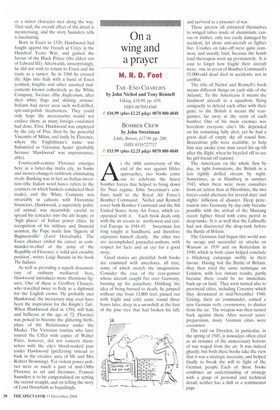On a wing and a prayer
M. R. D. Foot
TAIL-END CHARLIES by John Nichol and Tony Rennell Viking, £18.99, pp. 470, ISBN 0670914568 (0 £16.99 (plus £2.25 p&p) 0870 SOO 4848 BOMBER CREW by John Sweetman Little, Brown, £17.99, pp. 280, ISBN 0316727717 CO £15.99 (plus £2.25 p&p) 0870 800 4848 As the 60th anniversary of the end of the war against Hitler approaches, two books come out to celebrate the heavy bomber forces that helped to bring down his Nazi regime. John Sweetman's confines itself to the Royal Air Force's Bomber Command; Nichol and Rennell cover both Bomber Command and the 8th United States Army Air Force, which cooperated with it. Each book deals only with the air events in north-west and central Europe in 1944-45. Sweetman has long taught at Sandhurst, and therefore expresses himself clearly; the other two are accomplished journalist-authors, with respect for facts and an eye for a good story.
Good stories are plentiful: both books are crammed with anecdotes, all true, some of which stretch the imagination. Consider the case of the rear-gunner whose aircraft caught fire over Germany, burning up his parachute. Disliking the idea of being burned to death, he jumped without one from 13,000 feet; passed out with fright and cold; came round three hours later, deep in a snowdrift at the foot of the pine tree that had broken his fall; and survived as a prisoner of war.
These aircrew all entrusted themselves to winged tubes made of aluminium, canvas or timber, only too easily damaged by accident, let alone anti-aircraft or fighter fire. Crashes on take-off were quite common, and usually fatal, because the bomb load thereupon went up prematurely. It is easy to forget how fragile their aircraft were: one in seven of Bomber Command's 55,000-odd dead died in accidents, not in combat.
The title of Nichol and Rennell's book means different things on each side of the Atlantic. To the Americans it means the hindmost aircraft in a squadron, flying compactly to defend each other with their guns; to the British it means the reargunner, far away at the stern of each bomber. One of his main enemies was boredom: everyone else's life depended on his remaining fully alert, yet he had a great deal of empty sky all round him. Benzedrine pills were available, to help him stay awake (one man saved his up till after the flight, when he bicycled off to see his girl-friend off station).
The Americans on the whole flew by day, in tight formations, the British in a less tightly drilled stream by night. Sometimes, as at Hamburg in summer 1943, when there were more casualties from air action than at Hiroshima, the two forces could alternate for several days' and nights' infliction of disaster. Deep penetration into Germany by day only became possible with the arrival of the Mustang escort fighter fitted with extra petrol in drop-tanks. It is as well that the Luftwaffe had not discovered the drop-tank before the Battle of Britain.
The Germans had begun this world war by savage and successful air attacks on Warsaw in 1939 and on Rotterdam in 1940, which in both cases helped conclude a blitzkrieg campaign swiftly in their favour. Having lost the Battle of Britain, they then tried the same technique on London, with less instant results, partly because there could be no immediate back-up on land. They soon turned also to provincial cities, including Coventry which they devastated in mid-November 1940. Goring, their air commander, coined a new German verb, coventrieren, to shatter from the air. The weapon was then turned back against them. After several years' preparation, many German cities were coventriert.
The raid on Dresden, in particular, in the spring of 1945, is nowadays often cited as an instance of the unnecessary horrors of war waged from the air. It was indeed ghastly; but both these books take the view that it was a strategic necessity, and helped finally to break the will to fight of the German people. Each of these books combines an understanding of strategy with a grasp of personal and technical detail; neither has a dull or a sentimental page.










































































 Previous page
Previous page